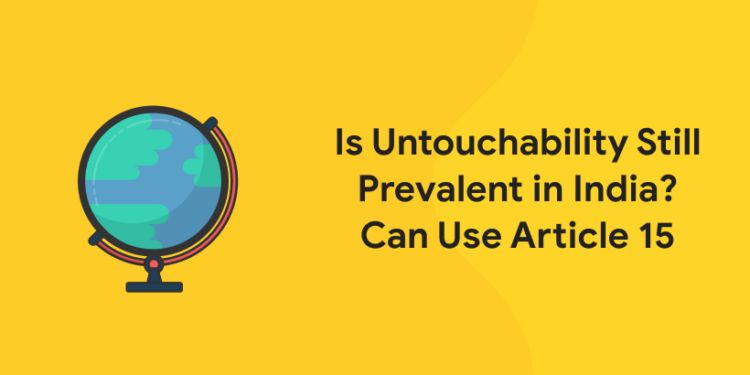Table of Contents
Untouchability has been a cruel practice in India which was formed by the people of upper caste against the people who belong to lower caste or categories. These types of discrimination are very disheartening for the people who belong to certain types of occupations who were ruled as unholy or unworthy. There are still certain places which practice untouchability and this is a thing of shame for a developed country like India. However, there are sometimes questions such as is untouchability still prevalent in India? Can use Article 15. You have to study more about your constitution in order to know about the rights that you can practice in order to keep yourself safe from discrimination. Check out the details of the untouchability act and untouchability in Indian constitution given below.
Check out the video lessons And Improve Your GK Now
Untouchability in India
Untouchability is an abolished practice prevalent in India since ancient times. Now, the practise of untouchability is abolished and this practice is also forbidden in any form. If you are practising untouchability then it will be a punishable offence. The Indian constitution provides certain rights to the citizens and among these rights is the right to equality which states that all of the citizens of India must be treated equally irrespective of their caste, creed, gender or religion. Untouchability can be still practised in both rural and urban areas of India in which there is less development and this practice is often done by the upper caste people towards the lower caste people, especially towards Indian Dalits.
Indian Dalits Fighting Untouchability
1: Who was the first woman President of India?
Indian Dalits have been fighting against the caste system for a very long time and the caste system in India is still prevalent because it involves ranks and gradation. In other words, there are certain rights and privileges which are provided to the higher cost people and similarly, there are specific disabilities which are provided to the lower caste people and these people are often called untouchables by the higher caste people. Over the years, the Indian government has been providing many different types of benefits to the people who are more vulnerable to such prejudice. The Indian government has also introduced the reservation system for the people belonging to lower categories and this has been a praiseworthy practice.
Practice Of Untouchability in India
Untouchability was practised in rural India and although some l newspapers will tell you that untouchability has become irrelevant in India but there are also some instances in which crimes related to untouchability are becoming National headlines. The Indian caste system was a very vast phenomenon because all of the main things related to spirituality depended upon the caste of an individual as per the reading state from ancient times. Some people were considered physically and ritually polluting due to their occupations and these assumptions resulted in untouchability and these people were named outcasts. The outcast people could not enjoy any rights because they were considered impure.
Article 15 Of The Constitution
Article 15 of the Constitution of India 1949 streets that there is the provision of discrimination on grounds of religion, race, caste, sex or place of birth for the residents of India. The states of India shall not discriminate against any citizens on grounds only of religion, race, caste, sex, place of birth or any of them. Any of the citizens of India must not be discriminated against and any of the citizens of India must not be stopped from getting access to shops public restaurants hotels and palaces of public entertainment or the use of wells, tanks, bathing ghats, roads and places of public resort maintained wholly or partly out of State funds or dedicated to the use of the general public. This article however does not stop the state from providing special treatment to children and women of India.
Article 15 Against Untouchability
There are various things which are stated in article 15 of the Constitution of India that are against the use of untouchability in India and that’s why a lot of people can file a case against the person who is discriminating against them on the basis of their caste. It is clearly mentioned in the constitution of India that you cannot discriminate against any person on the basis of their caste and if you do so you will be liable to get punished by the law. Article 15 also suggests that the states can make a special provision for the advancement of any socially or educationally backward section of the society or for the people who belong to scheduled caste or scheduled tribes. As a result, many institutions provide exposure to SC and ST candidates by providing them with reservations.
Check out the mock tests And Improve Your GK Now
Entri is a learning platform which was created by well-known experts in the industry in order to help people take into account various video lessons created in order to help them crack different types of government competitive examinations. You can check out the crash courses and also special courses available on our platform that will help you to learn about various skills that are needed in today’s society to be successful. Enrol now and you will be eligible to get a free mock test and check whether or not you are eligible to take your next competitive examination.














